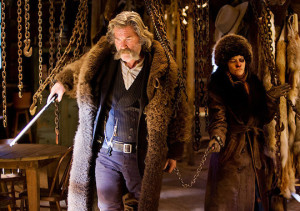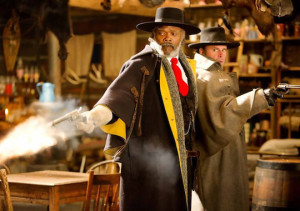by Peter Callaghan
Discordant strings pierce the silence. Snowy peaks fill the void. Over the wood-carved shoulder of a crucified Jesus, a horse-drawn stagecoach thunders into view. Storm clouds gather. Bird flocks scatter. Gnarled branches shed their leaves and mourn the passing of summer and the fallout of the American Civil War as a black bounty hunter with three pulseless rednecks plants his leather boots knee-deep into the snowy pathway of the fast-approaching carriage. “Howdy nigger!” hollers a ruddy-faced felon before a voice from within rudely interrupts: “Don’t you know darkies don’t like being called niggers no more? They find it offensive.”
A blistering opening by the provocative but brilliant filmmaker Quentin Tarantino who along with his three-time Oscar-winning cinematographer Robert Richardson, BAFTA-nominated editor Fred Raskin and multi-award-winning composer Ennio Morricone for whom this is his first complete Western score in almost forty years have crafted a wonderful work of beauty laced with devilish humour, colourful characters and moments of great tension which, with the exception of an abrupt intermission and needless narration voiced by Tarantino himself, holds the audience in the palms of their hands for nigh on three hours.
The “Howdy nigger” is Major Marquis “The Bounty Hunter” Warren (Samuel L. Jackson) doing what Samuel L. Jackson does best: growl and glare, grin and goad). The voice from within, a fellow bounty hunter of Caucasian persuasion, John “The Hangman” Ruth (Kurt Russell) sporting a wonderful handlebar moustache and the ruddy-faced felon chained to his bear-skin sleeve is Daisy “The Prisoner” Domergue, a broken-toothed wench with a black eye and a foul tongue whose redneck he’s escorting to the Red Rock executioner for the not to be sniffed at fee of $10,000 which is two grand more than The Bounty Hunter’s catch of three pulseless confederates.
 After sharing the contents of a handwritten letter from his trusted pen pal the 16th President of the United States Abraham Lincoln, The Bounty Hunter persuades the impressed Hangman to transport both him and his trio of stiffs to Red Rock too. End of Part One. During the second of six chapters, they pick up Chris “The Sheriff” Mannix (Walton Goggins) who as luck would have it is en route to the same small town where he is due to be sworn into office and as part of his ceremonial duties reward bounty hunters for their Wanted Dead or Alive(s). A heated debate ensues about The Bounty Hunter’s escape from a confederate prison, which inadvertently claimed the lives of 37 Caucasians. After letting bygones be bygones over their opposing loyalties during the bitterly fought American Civil War – “You joined the war to keep niggers in chains,” snarls The Bounty Hunter to The Sheriff. “I joined to kill white crackers.” – to Red Rock they thunder.
After sharing the contents of a handwritten letter from his trusted pen pal the 16th President of the United States Abraham Lincoln, The Bounty Hunter persuades the impressed Hangman to transport both him and his trio of stiffs to Red Rock too. End of Part One. During the second of six chapters, they pick up Chris “The Sheriff” Mannix (Walton Goggins) who as luck would have it is en route to the same small town where he is due to be sworn into office and as part of his ceremonial duties reward bounty hunters for their Wanted Dead or Alive(s). A heated debate ensues about The Bounty Hunter’s escape from a confederate prison, which inadvertently claimed the lives of 37 Caucasians. After letting bygones be bygones over their opposing loyalties during the bitterly fought American Civil War – “You joined the war to keep niggers in chains,” snarls The Bounty Hunter to The Sheriff. “I joined to kill white crackers.” – to Red Rock they thunder.
But not before stopping off at Minnie’s Haberdashery, a snowbound cabin in the back of beyond with an open hearth and a fully stocked bar which serves up “the best coffee in the world” and a piping hot bowl of Minnie’s legendary stew. But something’s not right. Minnie, a buxom and self-proclaimed “fat ass” Dana Gourrier, is visiting her mom, seemingly. And her sidekicks Sweet Dave and chicken-plucking Gemma (Gene Jones and Belinda Owino) are nowhere to be seen. In their place are Demián Bichi as Bob “The Mexican” and four suspect travellers: Tim Roth as Oswaldo “The Little Man” Mobray, Michael Madsen as Joe “The Cow Puncher” Gage, Bruce Dern as General Sanford “The Confederate” Smithers and a concealed Channing Tatum as Jody “No Nickname” Domergue.
After splitting the room in half, with the Unionists slouched at the bar and the Confederates huddled round the fire, it doesn’t take long for the so-called neutral territory of the dinner table to be engulfed in gunpowder, treason and plot – and the small matter of poisoning the coffee. Bodies drop faster than The Bounty Hunter’s drawers who, to the tune of Silent Night in one of the greatest scenes in the movie, gleefully recounts how he forced a begging Confederate to “suck my big black pecker”. To paraphrase the kilted Christopher Lambert in The Highlander, out of the hateful eight “there can be only two”. Both, of whom lie slumped on the floor at the end of the film with a bellyful of bullets and a fistful of dollars.
 Some conservative critics and irate punters (many of whom have probably not even seen the film) have criticised The Hateful Eight for the same reasons that Tarantino’s previous masterpiece Django Unchained fell foul of the PC police: for the prolific use of the N-word. But in that regard I am nonplussed, for three reasons. Firstly, Tarantino is reflecting not promoting the crude language and overt racism, which was commonplace during the time of the American Civil War. Secondly, everyone gets a roasting including blacks, redskins, gringos and wenches (though, for once, my fellow faggots are not on the receiving end, so to speak).
Some conservative critics and irate punters (many of whom have probably not even seen the film) have criticised The Hateful Eight for the same reasons that Tarantino’s previous masterpiece Django Unchained fell foul of the PC police: for the prolific use of the N-word. But in that regard I am nonplussed, for three reasons. Firstly, Tarantino is reflecting not promoting the crude language and overt racism, which was commonplace during the time of the American Civil War. Secondly, everyone gets a roasting including blacks, redskins, gringos and wenches (though, for once, my fellow faggots are not on the receiving end, so to speak).
And, thirdly, despite the Civil Rights Act of 1964 right through to the crowning glory of Barack Obama‘s inauguration as the 44th President of the United States, racist views such as those espoused in the film are still sadly prevalent in many southern farmlands and inner city ghettos: “I guess it’s true what they say about you people, you can’t trust a word of what comes out of your mouth”, “when niggers are scared, that’s when white folk are safe” and “I don’t know that nigger, but I know he’s a nigger and that’s all I need to know.”
But, for me, the real message behind Tarantino’s brilliant and blistering, entertaining and engaging, wickedly funny and nigh on perfect crowd-pleaser (nigh on because of the sudden intermission, needless narration and stock characters such as The Mexican who lacks depth and teeters on the brink of parody) is encapsulated in one of the final lines of the movie: “We still have a long way to go, but hand in hand I know we’ll get there.” With a running time of almost three hours and with most scenes confined to a ramshackle stagecoach and a claustrophobic cabin, The Hateful Eight might prove a test too far for those of a soundbite disposition; but as the shot-shy sheriff loudly proclaims, “I’ll be double dog damned” if it’s not a grateful wait!
[imdb id=”tt3460252″]
- REVIEW: Orphans @ Edinburgh King’s Theatre
- 13th April 2022
- REVIEW: Everybody’s Talking About Jamie @ Edinburgh Festival Theatre
- 30th March 2022
- REVIEW: Sheila’s Island @ Edinburgh King’s Theatre - 2nd March 2022










